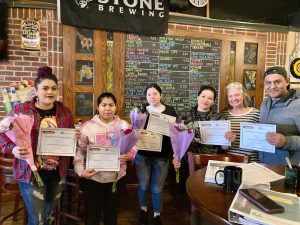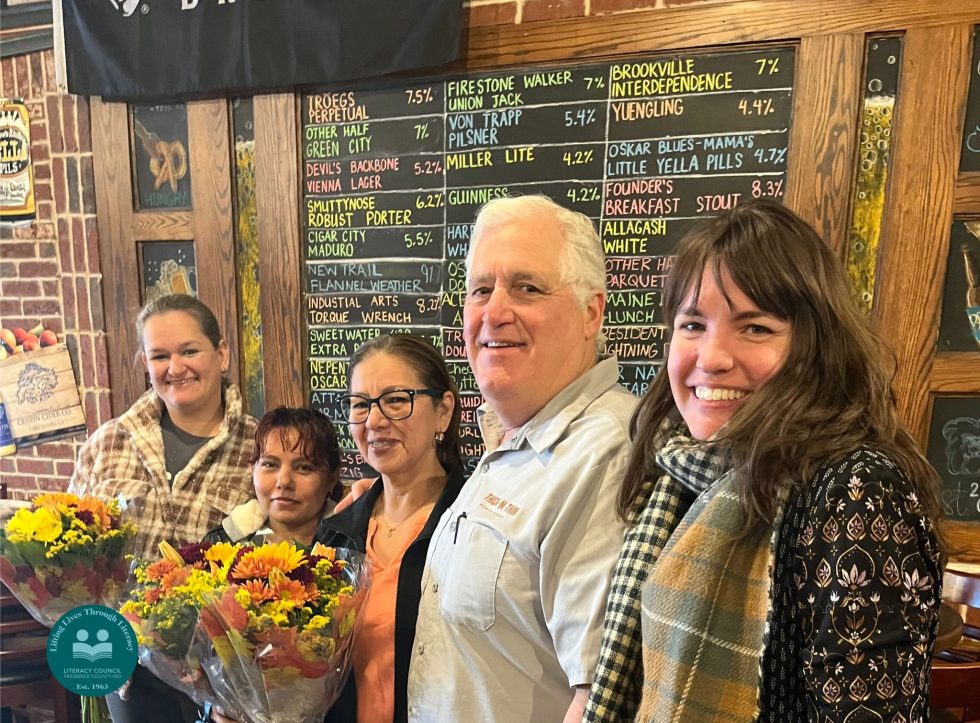Oscar’s Alehouse Supports Local Workforce with Workplace Literacy Program
Ralph DeRose is a partner in Oscar’s Alehouse, a group of restaurants in Maryland that has built its success by creating family-friendly spaces where customers enjoy “top-notch food and service,” he says. Another ingredient in the restaurants’ success, Ralph notes, is a policy of giving something back to patrons’ communities whenever possible.
In the restaurant group’s way of thinking, finding ways to show support makes sense for local businesses. “Business owners should make this kind of engagement part of their marketing strategy,” Ralph says. Why put money into something like flyers, when you can put it back into the community? If you’re going to be part of a community, you must pay attention to it.”
And Ralph is a guy who pays attention, most recently to a “community” of nine of his employees in the Oscar’s Alehouse West restaurant in Frederick. They have been showing up twice a week since January, an hour before the restaurant opens, to attend ESL (English as a Second Language classes) taught by tutors, as part of the Frederick County Literacy Council’s Workplace Literacy Program.
The idea to start a program like this at Oscar’s West, was sparked during a conversation between Ralph and his partner one morning. “I was wondering about what we could do to help employees interested in improving their English-speaking skills [so they could relate better] with the culture outside the workplace. I thought how cool it would be to do something like this for our employees.”
Ralph’s confidence in the importance of English literacy was influenced by the story of his Italy-born father’s immigration experience years ago. “My dad was living in the home of his father’s close friend,” Ralph recalls. And this man didn’t cut the young immigrant a lot slack. “Dad said he couldn’t get a glass of water unless he asked for it in English,” Ralph says. “He would drop dad off at night court after work” where he could absorb the language. “Dad was 17 years old and a pretty smart guy” Ralph says, but when he started to brag to the man about his fluency after a few months, he was told, “You are nothing in this country if you can’t also read or write English.” His father soon enrolled in English reading and writing classes and immersed himself in his new culture. And that, says Ralph, made all the difference. “My father attributed a lot of his success in this country to what this man had told him.”
Ralph didn’t let go of that idea. He proposed that they offer interested employees “an English class on a Saturday morning and see if anybody would come. I thought of asking my daughter-in-law who teaches Spanish if she might be interested in helping. When I told my wife about the idea, she suggested that I might want to check with the Literacy Council.” He was familiar with the council after supporting one of their Scrabble Mania for Literacy fund-raising events. “I knew Sharon Jacko (a former president of the council’s board of directors) a little bit, and she told me that the council had a grant that funds a program that provides tutors for workplace ESL classes.” Ralph called Andrea Ormsby, Community Outreach Coordinator, “and we got the ball rolling after we learned that there was interest in it among some workers. So, one manager comes in an hour early on Monday to let in the students, and I do the same thing on Wednesday.” 
Two 12-week classes are running right now: Beginning Literacy and Low Beginning levels. There are a total of nine employees between the two classes, which end in March. “We’ll celebrate when they finish this semester,” Ralph says. “The employees appreciate the classes and look forward” to learning for another semester. “It’s been a win-win situation,” he says. “I really think what the Literacy Council is doing [through the Workplace Literacy Program] is admirable. And their commitment is great.”
The same could be said about Ralph DeRose.



